- Home
- P. T. Deutermann
The Last Man Page 17
The Last Man Read online
Page 17
Which was when he heard the murmur of voices.
He froze in the shadow of the rock, not daring to even move his head.
It sounded like the voices were above him, up on the top edges of the western ravine. They were speaking softly, but in the desert air, every word was clear, if totally incomprehensible. Israeli soldiers? Bedouins? An image of hooded men with knives popped into his mind. He squinted, listening hard. It sounded like Hebrew, but he didn’t know either language well enough to be sure. Then came a surge of panic when he realized that they should be able to see him.
All his fatigue vanished. Don’t move, he thought. Don’t move one muscle. Don’t turn your white face up the hill. Meld in with the sand and the rocks. With any luck they were just finishing their patrol, anxious to get back down to the truck, and not carefully probing the sands for sign of human passage, or sweeping the slopes of the ravine with infrared devices. Or just looking for tracks.
He tried hard to control his breathing, aware that a light cloud of dust probably still hung in the air around him from his slide down the sand hill. There had to be a big furrow down that slope, too, more evidence of his presence. Hell, they had to spot him.
He could hear their steps crunching through the sand, along with an occasional clink of hardware. Hardware: Then these had to be soldiers. It had to be the Israeli patrol. Then the voices were passing above him, rising in volume and number until a short, barked command brought silence. David held his breath. Discovery? Or was the sergeant reimposing some tactical discipline? He waited, his throat and mouth dry, trying to figure out which way they were going, hoping against hope that it was up the western ravine toward the plateau that held the Roman camp. He did not want them going down the ravine and finding his tracks at the ramp. Except that he and Judith had walked that way, so maybe tracks weren’t that important. Shit!
After a few more minutes, the sounds of the patrol died away, and he relaxed again. Wait a while, he thought. Make sure they don’t double back. He yawned mightily, releasing the tension in his face. Not too long, though: You’ve got to be back in the hostel in an hour or you’ll be caught out in the moonlight. He closed his eyes and tried to regain control of his breathing.
Fifteen minutes later he jerked awake. He swore out loud and then abruptly held his breath, listening to see if anyone had heard. He couldn’t believe it: He’d gone to sleep! Yet it was incredibly comfortable down here in the warm sand. Only with a great effort did he manage to rouse himself for the trek back down the ravine to the hostel.
12
Thursday morning David got his wish: Judith agreed to his taking the cable car back up the mountain by himself. She seemed to be somewhat distracted, and when he left to go upstairs to catch the first cable car, she was having an animated conversation in Hebrew with the hostel manager. A group of German college kids had arrived for an overnight stay in the hostel, creating some noisy confusion around the front desk.
As he rode up in the cable car he tried to keep from yawning. He had made it back to the room by four thirty and had dropped off into a sound sleep after only a few minutes of excited speculation about what he might find once he located a way into that cistern. He had reviewed the data image on his computer before going down to meet Judith for breakfast. Whatever it was, natural or man-made, it was truly huge, and he wondered again if by some slim chance the defenders had not even known about it. He quickly discarded that notion: Water was the single most precious commodity in desert siege logistics. Someone would have had to realize that all that runoff was going somewhere. He had written down the coordinates of the image in one of his notebooks, and then, after a moment’s deliberation, he had deleted the image from the computer before leaving it unattended. That way, if his secret project was uncovered before he had time to find the cistern’s entrance, no one would know what he had found. The image on the screen, with its brightly shining edges, remained fixed in his mind even as he sat with Judith for breakfast and babbled on about spending a day in the casemate rooms.
“What is the attraction of the casemate rooms?” she had asked.
“That’s where they lived,” he replied earnestly. “The Zealots. During the siege. The palaces had been abandoned, and they’d even used some of the building materials from the palaces to reinforce the walls. The Yadin expedition found hearths, middens, and living quarters all throughout the casemate system. I want to get a feel for that.”
“I see. There is much that we do not know about the Kanna’im, your so-called Zealots. Or perhaps you do not know. There is much controversy. ”
“I thought most of the controversy was over the Dead Sea Scrolls.”
“There is plenty there as well, and far too much secrecy, especially with foreign scholars holding tight to their discoveries. The problem is that we do not know for sure who these Zealots were. Yadin calls them Kanna’im, fanatics. Others call them Sicarii, the Daggermen. More like mercenaries for hire than patriots. Political activists, agitators, Roman haters. There is even speculation that there were Essenes here.”
“My guess is,” he said, after a moment’s reflection, “that they were mostly all survivors from the end time up at Jerusalem.”
She had thought about that for a few minutes while they finished their coffee and watched the first tour buses roll into the parking lot.
“I have often wondered about that,” she said finally. “Speaking personally, not professionally, I would have expected Yadin to have found some evidence of that, some things taken from the city in its last hours. If most of the defenders here had come from Jerusalem, that is.”
He had almost stopped breathing. Had she figured it out? Was she hinting that she knew why he was really here? He watched her out of the corner of his eye as he pretended to look out the window, but there was nothing in her face to indicate that she was playing games.
“I would agree,” he said, trying to keep his voice casual, “but if they had, they would have been valuable things. This place has been exposed for two thousand years. Valuable things…”
“Yes, of course. Long gone. I have work to do. You had better go upstairs or you will miss the first cable car.”
As the gondola bumped gently into the landing dock, he told himself to put Judith Ressner out of his head. As long as she had not caught on to what he was really here for, his job now was to focus, focus, focus.
Once on the mountain he walked down the steel steps near the eastern gate into extremely bright sunlight. Twenty tourists followed him down and then collected around their guide, who launched noisily into her spiel. David walked casually away from the group, moving slowly toward the southern end of the plateau, where, in comparison with the palace ruins and the spectacular views on the north rim, there was very little to see except the badly deteriorated casemate walls. He calculated that there was about a sixty-foot net drop in elevation from the western palace down to the eastern gate, and as he walked along the eastern wall, he kept his eye out for any signs of where the water would go. There was always the chance that the collection point was in the casemate wall, and, in fact, there was one cistern shown cut into the southeastern rim on the Yadin maps, about one hundred fifty yards away from the eastern gate area. That ball had come down here, though, not to the gate, even when he released it from three different points up by the western palace walls and the remains of the Byzantine-era church.
When the tourist group moved off toward the northern palace complex, he turned around and ambled back over to the area between the eastern gate and the cable-car landing. The two young security guards who had come up on the first run were following the tourists, attracted no doubt by some of the more nubile German girls who were dressed for a day in the hot sun. David had on his sun hat and cotton khakis and was ready to get out of that direct sunlight.
To the right of the eastern gate were the remains of one of the Byzantine buildings. Not much survived: low walls, exposed foundations, and piles of rubble that were identified here and ther
e by tour placards. Near the easternmost point in the wall system, in an area the size and general shape of a baseball diamond, there was a strangely shaped low stone wall that paralleled the casemate wall for about sixty feet and then cut in toward the center of the flat area to the right of the eastern gate complex. At the lowest point was a hollow depression that might have once been a shallow pool.
David studied the wall and the saucerlike depression. The wall did not seem to be part of a building foundation, more a curtain wall of some kind, delineating an area rather than providing security for it. There was a tourist information sign down by one end of the wall. He walked down to the sign.
ORCHARD AREA, the sign’s title read. “In this area is believed to be the location of an olive or fruit tree orchard, sited here because the low ground would capture the occasional rainwater that came once or twice a year to the mountaintop. Several other parts of the plateau were believed to have supported cultivation in ancient times.”
Well, now, David thought. So the archaeologists confirmed that rain runoff, however infrequent, would end up down here. That pool, however, would not hold much water. Why had they surmised an orchard of some kind and not a cistern? He tried to recall the data image. Where he was standing should be very nearly right on top of the eastern edge of that cavity, with the bulk of the cistern actually lying under the amphitheater-shaped ground that rose behind him toward the western palace. He turned around and looked up the slope. From here, the focus point, the slope was easily discernible, especially in the bright light of day. So if there was a cistern under here, where would the inlet be?
He looked around to see if anyone was watching, but the tourists had all moved up the hill, panting security guards in tow. The cable-car wheels were rolling again, meaning another load was inbound. He walked over to the casemate walls and stepped through a hole in the crumbling brickwork, down into the shadow of the corridor running down between the inner and outer walls. Here the roof had been reconstructed. Once the next load of tourists had disembarked and the car started down, he walked back out into the sunlight, notebook in hand, studying the ground. From the sounds of them, these tourists were Americans. He turned his back on them, hoping no one would come over, and ambled slowly around the area. He looked to see if there were any traces of the explosive source, but nothing was visible in the hot dust.
There had been no hole in the bottom of the dry pool, and there was nothing but rubble, battered square stone building blocks, patches of gravel, slate-flat stone, and the foundations of the Byzantine-era buildings. The only anomaly was that strange low wall that hooked out from the casemate walls.
He walked over to the wall again and, after looking around first, kicked at it absently. Solid, ancient rock. If sheets of rainwater were flowing down this hill, he mused, what would this wall do? It would keep that water away from the casemate wall foundations, which he suddenly realized were slightly lower than the surrounding ground. Okay, he thought, I can understand that, but it means the water would be diverted to, well, to the foundations of the Byzantine enclosure and that damned pool.
He walked back over to that ruin and stepped over the foot-high foundation walls. The enclosure was about seventy feet by thirty, shaped roughly in a rectangle, except that the wall on the southern end of the rectangle was curved and was also incomplete, as if to allow vehicles or perhaps animals to be driven inside. He realized he needed to see it from above, so he walked over to the cable-car platform, past a pile of steel scaffolding pipes, and climbed up the twenty steps to the loading and unloading platform. Looking down the drooping cable, he could see a small crowd getting into the car at the tourist center, a half mile distant. He pretended to be sketching in his notebook in case anyone was watching from the tower down below.
He turned around and looked down at the Byzantine enclosure, confirming the notion that the southern end was open for a reason: There was no hint of a foundation wall in the smooth rock surface at that end. Staring up the shallow slope, he tried again to visualize where the water would go. It would sweep across and down this hill, divert along that odd-shaped low wall, into the shallow pool, and then—what? Where would it go? He suddenly realized, from his perspective above the ruins, that the water would then sweep all the way around the Byzantine enclosure, which he saw now was shaped like a drain. It would have to end up inside that building, if indeed it had been a building. Maybe there had been another pool of some sort, not like one of the fancy Roman-style baths up in the two palaces but a watering hole, perhaps for livestock.
He climbed back down off the cable-car tower and walked back over to the casemate walls on the eastern side of the Byzantine enclosure. It was getting really hot now, the sun blazing over the Dead Sea like a malevolent furnace. There were several smaller cisterns cut into the eastern and southern rim of the mountain, so maybe the water filled the pool and then was diverted to a central channel to fill them. Studying the ground, he finally found what he was looking for: two dirt-clogged drain holes, about a foot square, leading under the inner casemate wall. He walked back to the opening he had used before, turned left, and went back down the casemate corridor until he found the two channel openings. There were no channels in the floor. Pipes, then? He looked harder. The floor was discolored. He poked at it and discovered that there were two channels, long since packed with hard dirt, running across the corridor and through the external wall. The dirt was packed hard enough to look and feel like stone.
Looking over his shoulder again, he walked over to the nearest arrow-slit aperture and looked out and down. Below was the steep slope up which the Serpent Path cut its zigzag pattern. He could see where the runoff channels came through the outer wall, and beneath that point there was an erosion notch in the hillside. Was there a rim cistern down there?
Excited now, he walked north along the rim, staying inside the casemate corridor, and back to the eastern gate. There he paused, standing in the shadow of the gate vestibule. He scanned the surrounding area to see where the two security guards were. They were still tagging along behind the German tourist group, now talking to three of the girls. David slipped out the gate and walked down the stone steps, stepping down onto the flat area on the hillside that ran directly beneath the fortress walls. The Serpent Path stretched away in the first of its switchbacks leading down the mountain. Overhead the cable car squeaked and groaned as it neared the tower landing at the summit. He waited close by the walls until the empty car had started back down. He realized now he had to be in full view, or almost so, of the observation post below. Actually, not quite: A shoulder of the hillside would block their view of him as along as he stayed close to the bottom of the exterior casemate wall. Fifty feet down the Serpent Path, though, and they would be able to see him, but he didn’t need to go down: He needed to climb across the base of the wall to that notch.
Proceeding very carefully, he did a hand-over-hand act along the bottom of the crumbling wall. The stones were already hot to the touch. With no path, the footing was very treacherous, and twice he felt himself starting to tumble down the hillside, only to stop the incipient slide by grabbing one of the scraggly bushes growing along the wall. It took him fifteen minutes to eke his way over to the notch, and he had to scuff a small level area in the dirt and sand so that he could stop there. He took one last look down the escarpment to confirm he was still out of the guard tower’s sight line. Then he knelt down and looked inside.
When his eyes adjusted to the shadows, he saw a small cavelike opening in the base of the wall. Looking at the walls, he realized it was a man-made cave, probably the remains of a rim-wall cistern. It was bone dry, like all the other cisterns, and no more than twenty feet in diameter. He could tell that it was man-made because of the obvious tool marks in the stone near the entrance. The floor of the cavity was almost level with the opening in the hillside and sloped down from back to front. There was a small patch of grayish light coming from a tiny aperture up above, no bigger than a handhold. There were no
steps per se at the opening, but the dirt and gravel that had fallen through the opening provided a loose ramp, and, looking around one last time, he let himself into the cistern.
* * *
Judith was just about to declare victory in a software fight with her portable computer when there was a knock on the door.
“Yes?”
“Phone call for Dr. Ressner. From Tel Aviv.”
“Thank you.” She looked at her watch. Eleven o’clock. As good a time as any to break. The room was starting to heat up. David Hall had been smart to take a first-floor room. She energized the screen saver and went downstairs.
The sole phone for guest use was next to the front desk. She looked around at the lobby, crowded noisily with milling tourists, and asked if she could use an office extension. Forbidden. She sighed and picked up the receiver, putting a finger in her ear to silence the noise coming from the cable-car machinery room.
“This is Judith Ressner.”
The ghostly voice of Colonel Skuratov answered. “Good morning, Dr. Ressner. Skuratov here. Calling to see if everything is going smoothly. With the American.”
“So far, yes.”
“Very good. He is what he seems to be? A privileged tourist?”
“Yes. That is my impression. He has studied the history.”

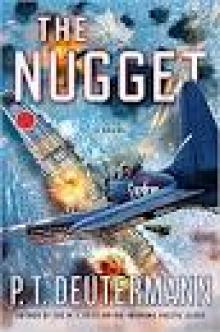 The Nugget
The Nugget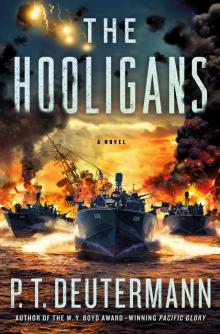 The Hooligans
The Hooligans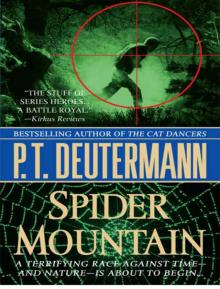 SPIDER MOUNTAIN
SPIDER MOUNTAIN![Cold Frame [retail] Read online](http://i1.bookreadfree.com/i/03/19/cold_frame_retail_preview.jpg) Cold Frame [retail]
Cold Frame [retail] Sweepers
Sweepers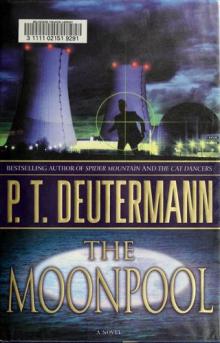 Cam - 03 - The Moonpool
Cam - 03 - The Moonpool Trial by Fire
Trial by Fire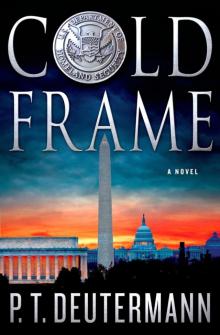 Cold Frame
Cold Frame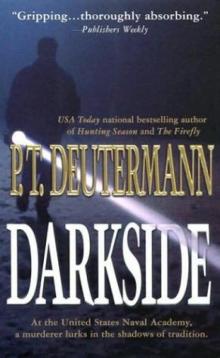 Darkside
Darkside Cam - 04 - Nightwalkers
Cam - 04 - Nightwalkers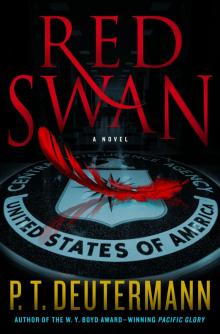 Red Swan
Red Swan The Commodore
The Commodore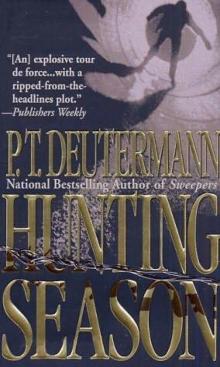 Hunting Season
Hunting Season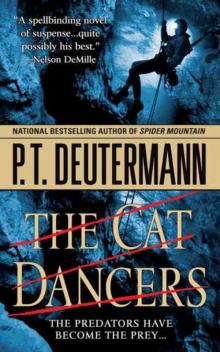 The Cat Dancers
The Cat Dancers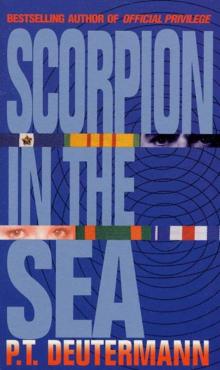 Scorpion in the Sea
Scorpion in the Sea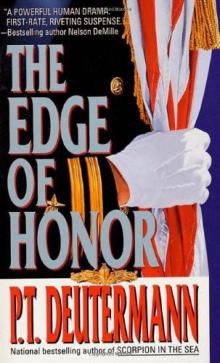 The Edge of Honor
The Edge of Honor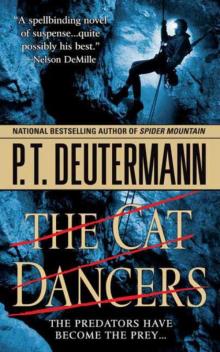 The Cat Dancers cr-1
The Cat Dancers cr-1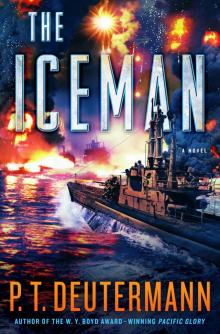 The Iceman
The Iceman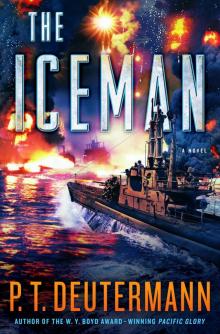 The Iceman_A Novel
The Iceman_A Novel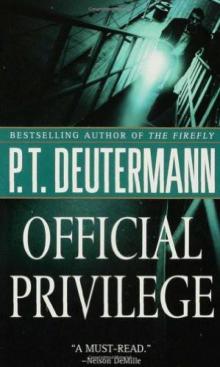 Official Privilege
Official Privilege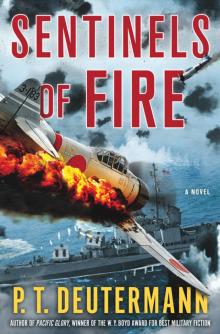 Sentinels of Fire
Sentinels of Fire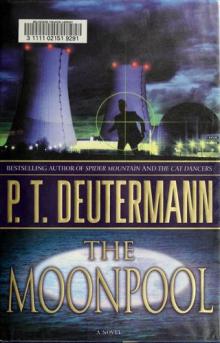 The Moonpool cr-3
The Moonpool cr-3 Nightwalkers cr-4
Nightwalkers cr-4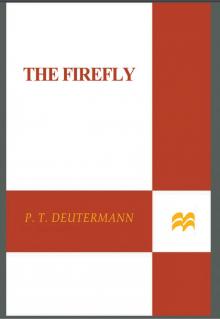 The Firefly
The Firefly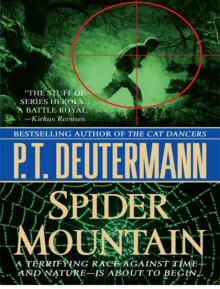 Spider mountain cr-2
Spider mountain cr-2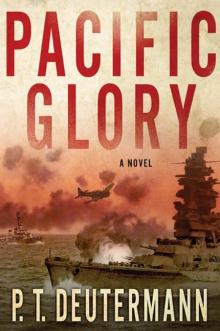 Pacific Glory
Pacific Glory The Last Man
The Last Man